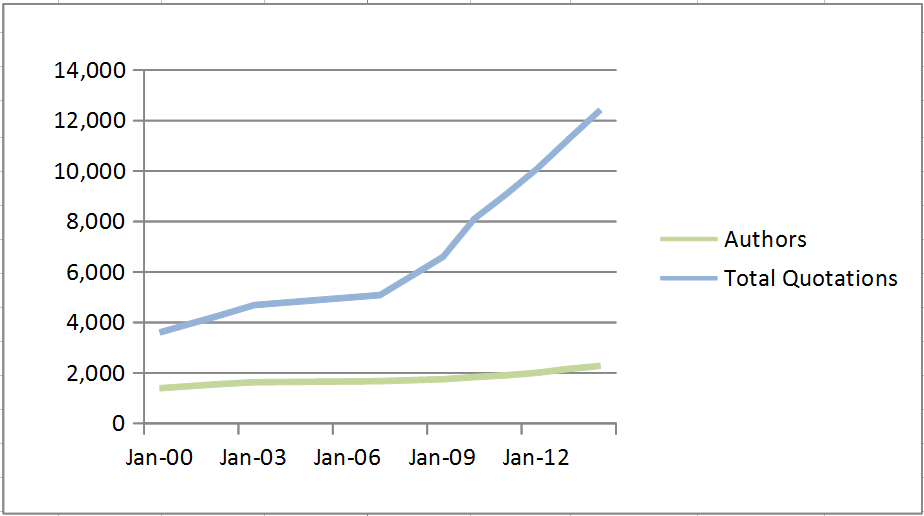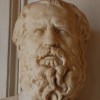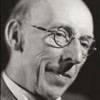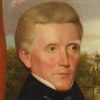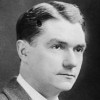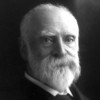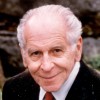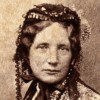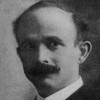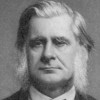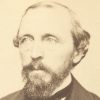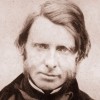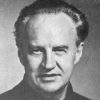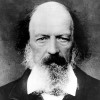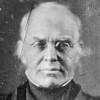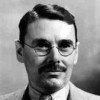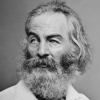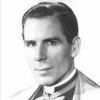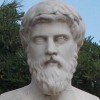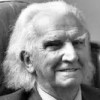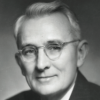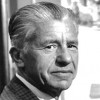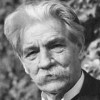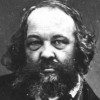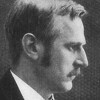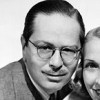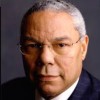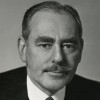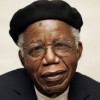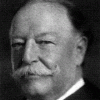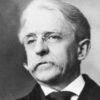The true democracy, living and growing and inspiring, puts its faith in the people — faith that the people will not simply elect men who will represent their views ably and faithfully, but will also elect men who will exercise their conscientious judgment — faith that the people will not condemn those whose devotion to principle leads them to unpopular courses, but will reward courage, respect honor, and ultimately recognize right.
I wonder how many men, hiding their youngness, rise as I do, Saturday mornings, filled with the hope that Bugs Bunny, Yosemite Sam and Daffy Duck will be there waiting as our one true always and forever salvation?
Administrivia: Doing the Numbers: 3/2014
Another year, another “State of the WIST” post. I last ran this report a year ago. Let’s start with the raw count:
So, yeah, nice, steady progress. Generally speaking I post five quotes a day, every weekday. Sometimes something gets in the way, but by and large it’s been a workable schedule.
Broken out into a graph (and normalizing the timeframe):
I’ve been making a conscious effort to increase the number of authors (or not shy away from adding a one-off by a new author). That makes for better diversity.
Of the authors I do have, who are the most quoted in WIST?
A lot of this is based on blocks of quotes I go through in a given year. A lot of Thomas Jefferson and Samuel Johnson have been popping up the last twelve months, with Johnson being on the Top Ten list for the first time in quite a while — looking at the backlog, he may end up on top by this time next year. Ben Franklin has also clawed his way back onto the leader board.
“Losers” (dropping off the Top Ten) were Bertrand Russell and Winston Churchill.
The Top Ten Author list is shown “live” in the sidebar — as is the Top Ten Visited Quotations. That list shows less movement, since it is cumulative over all time:
- – Aeschylus, Agamemnon, l. 179 (4,520 from 3,316)
- – Robert Frost, “The Lesson for Today,” A Witness Tree(1942) (3,671 from 2,944)
- – James Baldwin, “In Search of a Majority,” Speech, Kalamazoo College (Feb 1960) (2,411 from 2,138)
- ↑ John Steinbeck, Nobel prize acceptance speech (10 Dec 1962) (2,357 from 1,769)
- ↑ Thomas Campbell, “Hallowed Ground” (1825) (2,206 from 1,764)
- ↓ Bertrand Russell, “The Triumph of Stupidity” (10 May 1933) (2,002 from 1,842)
- – Seneca the Younger, Moral Essays, “On Tranquility of Mind [De Tranquillitate Animi],” 17.10 [tr. W. Langsdorf (1900)] (1,689 from 1,448)
- – Albert Einstein, (Spurious / Synthetic) (1,572 from 1,354)
- – Michel de Montaigne, “That to Philosophize Is to Learn to Die,” Essays (1588) [tr. D. Frame (1958)] (1,473 from 1,317)
- – Molly Ivins, “Get a Knife, Get a Dog, but Get Rid of Guns,” Fort Worth Star-Telegram (9 Mar 1993) (1,361 from 919)
Unfortunately, I can’t track the most popular items in the last year, but for the last 60 days, per Google Analytics:
- John Kennth Galbraith, “Stop the Madness,” Interview with Rupert Cornwell, Toronto Globe and Mail (6 Jul 2002) – 152 Views
- Robert Frost, “The Lesson for Today,” A Witness Tree (1942) – 36 Views
- T. H. Huxley, “A Liberal Education and Where to Find It” (1868) – 30 Views
- Thomas Campbell, “Hallowed Ground” (1825) – 30 Views
- Molly Ivins, “Get a Knife, Get a Dog, but Get Rid of Guns,” Fort Worth Star-Telegram (9 Mar 1993) – 27 Views
So some overlap there.
Google Analytics shows me my traffic is way down this year — 25 visitors/day vs 83 (21 o them unique), with 34 pageviews/day vs 254. That’s a bit disappointing, though it’s not going to stop me from continuing the site by any means. I’d love to drive more traffic here — not just for the egoboo but because I’d like to think it’s a valuable resource. The question is how. (Suggestions are welcome.)
Over 90% of my traffic is from English-speaking space, about 70% from the US. Though I do get hits from UK, Canada, France, India, Australia, Sweden, the Netherlands, Romania and Germany in the top ten. Chrome and IE are the top contenders for browser, and 71% of visitors are on Windows; the next biggest OS is iOS, so a lot of iPhone/iPad viewers out there. One of these years, after I hit the lottery, I’ll craft a mobile version of WIST that can deal with all of the realignment of fields I do to make all these beautiful quotations …
Out of every one hundred men, ten shouldn’t even be there, eighty are just targets, nine are the real fighters, and we are lucky to have them, for they make the battle. Ah, but the one, one is a warrior, and he will bring the others back.
A dogmatical spirit inclines a man to be censorious of his neighbors. Every one of his opinions appears to him written, as it were, with sunbeams, and he grows angry that his neighbors do not see it in the same light. He is tempted to disdain his correspondents as men of low and dark understandings because they do not believe what he does.
Sir, there is one Mrs. Macaulay in this town, a great republican. One day when I was at her house, I put on a very grave countenance, and said to her, “Madam, I am now become a convert to your way of thinking. I am convinced that all mankind are upon an equal footing; and to give you an unquestionable proof, Madam, that I am in earnest, here is a very sensible, civil, well-behaved fellow-citizen, your footman; I desire that he may be allowed to sit down and dine with us.” I thus, Sir, shewed her the absurdity of the levelling doctrine. She has never liked me since. Sir, your levellers wish to level down as far as themselves; but they cannot bear levelling up to themselves.
It amounts to this — Literature is not a mere Science, to be studied; but an Art, to be practised.
Arthur Quiller-Couch (1863–1944). British poet, novelist, scholar, critic
On the Art of Writing, Lecture 12 “On Style,” Cambridge University (28 Jan 1914)
(Source)
We may see the small value God has for riches by the people he gives them to.
Alexander Pope (1688-1744) English poet
“Thoughts on Various Subjects.” Miscellenies in Prose and Verse [pub. with Jonathan Swift], Vol. 2 (1727)
(Source)
May be quoting his friend, Dr. John Arbuthnot. The sentiment seems inspired by La Bruyere.
Through laziness and cowardice a large part of mankind, even after nature has freed them from alien guidance, gladly remain immature. It is because of laziness and cowardice that it is so easy for others to usurp the role of guardians. It is so comfortable to be a minor!
Immanuel Kant (1724-1804) German philosopher
“An Answer to the Question: What Is Enlightenment? Beantwortung der Frage: Was ist Aufklärung?]” (1784)
(Source)
The Americans are a good-natured people, kindly, helpful to one another, disposed to take a charitable view even of wrongdoers […] Even a mob lynching a horse thief in the West has consideration for the criminal, and will give him a good drink of whiskey before he is strung up.
An individual is the end product of the decisions he has made. He who fails to make decisions, for the consequences of which he is responsible, is not a person. The ego, the self, the personality — call it what you will — comes into being and grows through the process of making responsible decisions.
In the old times, women did not get their lives written, though I don’t doubt many of them were much better worth writing than the men’s.
It is not from the benevolence of the butcher, the brewer, or the baker, that we expect our dinner, but from their regard to their own interests. We address ourselves, not to their humanity but to their self-love, and never talk to them of our own necessities but of their advantage. Nobody but a beggar chooses to depend chiefly upon the benevolence of his fellow-citizens. Even a beggar does not depend upon it entirely.
I used to be very revolutionary, but now I think that nothing can be gained by brute force. People must be drawn to good by goodness.
Boris Pasternak (1890-1960) Russian poet, novelist, and literary translator
Doctor Zhivago [До́ктор Жива́го], Part 2, ch. 8 “Arrival,” sec. 5 [Yury] (1955) [tr. Hayward & Harari (1958), US ed.]
(Source)
Alternate translations:I used to be very revolutionary-minded, but now I think that nothing can be gained by violence. People must be drawn to good by goodness.
[tr. Hayward & Harari (1958), UK ed.]I used to be in a very revolutionary mood, but now I think that we'll gain nothing by violence. People must be drawn to the good by the good.
[tr. Pevear & Volokhonsky (2010)]
Creativity is allowing yourself to make mistakes. Art is knowing which ones to keep.
Scott Adams (b. 1957) American cartoonist
The Dilbert Principle (1996)
Sometimes misquoted as "Design is knowing which ones to keep." Sometimes misattributed to Douglas Adams or Ricky Gervais. More information here.
The churches used to win their arguments against atheism, agnosticism, and other burning issues by burning the ism-ists, which is fine proof that there is a devil but hardly evidence that there is a God.
The voters selected us, in short, because they had confidence in our judgement and our ability to exercise that judgement from a position where we could determine what were their own best interest, as a part of the nation’s interest.
Beware, Charlie, old men only lie in wait for people to ask them to talk. Then they rattle on like a rusty elevator wheezing up a shaft.
And if you seek a preservative against these snares, I say, strive earnestly to learn something, not only of the results, but of the methods of science, and then apply those methods to all statements which offer themselves for your belief. If they will not stand that test, they are nought, let them come with what authority they may.
T. H. Huxley (1825-1895) English biologist [Thomas Henry Huxley]
“Science and Religion,” lecture (Dec 1858)
(Source)
Quoted in The Government School of Mines, The Builder (Jan 1859)
Anger is a normal emotion if it is expressed when felt. Then it is over with. If one keeps a lid on it, it develops into resentment or hate. Sooner or later, resentment and hate explode, destroying others, or they are held in, destroying oneself.
Bernie Siegel (b. 1932) American writer and physician
Love, Medicine and Miracles (1986)
You don’t always have to go so far as to murder your darlings — those turns of phrase or images of which you felt extra proud when they appeared on the page — but go back and look at them with a very beady eye. Almost always it turns out that they’d be better dead. (Not every little twinge of satisfaction is suspect — it’s the ones which amount to a sort of smug glee you must watch out for.)
Diana Athill (1917-2019) British literary editor, novelist, memoirist
In “Ten Rules for Writing Fiction,” The Guardian (20 Feb 2010)
(Source)
See Quiller-Couch.
What is really desired, under the name of riches, is, essentially, power over men; in its simplest sense, the power of obtaining for our own advantage the labor of servant, tradesman, and artist; in wider sense, authority of directing large masses of the nation to various ends (good, trivial, or hurtful, according to the mind of the rich person).
A man who himself does not believe what he tells another … has even less worth than if he were a mere thing. For a thing, as something real and given, has the property of being serviceable. … But the man who communicates his thoughts to someone in words which yet (intentionally) contain the contrary of what he thinks on the subject has a purpose directly opposed to the natural purposiveness of the power of communicating one’s thoughts, and therefore renounces his personality and makes himself a mere deceptive appearance of man, not man himself.
We always say, one day we will laugh at this. I always try to make sure that this one day is today.
Jacob Aagaard (b. 1973) Danish-Scottish chess grandmaster, author
“Are chess players intelligent?” Quality Chess Blog (6 Oct 2010)
(Source)
We Americans live in a nation where the medical-care system is second to no one in the world, unless you count maybe 25 or 30 little scuzzball countries like Scotland that we could vaporize in seconds if we felt like it.
There should be no articles of faith in science, unless it be the faith that no discovery, no law, is so absolute that it cannot be superseded.
Anthony Storr (1920-2001) English psychiatrist and author
Feet of Clay: Saints, Sinners and Madmen, ch. 10 (1996)
(Source)
George’s first voyage was on a slaver, and he wished himself dead many a time before it was over, — and ever after would talk like a man beside himself, if the subject was named. He declared that the gold made in it was distilled from human blood, from mothers’ tears, from the agonies and dying groans of gasping, suffocating men and women, and that it would sear and blister the soul of him that touched it; in short, he talked as whole-souled, unpractical fellows are apt to talk about what respectable people sometimes do. Nobody had ever instructed him that a slaveship, with a procession of expectant sharks in its wake, is a missionary institution, by which closely. packed heathens are brought over to enjoy the light of the Gospel.
Look not every man on his own things, but every man also on the things of others.
The Bible (The New Testament) (AD 1st - 2nd C) Christian sacred scripture
Philippians 2:4 (KJV)
(Source)
Alternate translations:
- "Do not merely look out for your own personal interests, but also for the interests of others." (NASB)
- "Not looking to your own interests but each of you to the interests of the others." (NIV, NRSV)
But revolutions are made by fanatical men of action with one-track minds, geniuses in their ability to confine themselves to a limited field. They overturn the old order in a few hours or days, the whole upheaval takes a few weeks or at most years, but the fanatical spirit that inspired the upheavals is worshipped for decades thereafter, for centuries.
Boris Pasternak (1890-1960) Russian poet, novelist, and literary translator
Doctor Zhivago [До́ктор Жива́го], Part 2, ch. 14 “Return to Varykino,” sec. 14 (1955) [tr. Hayward & Harari (1958), US ed.]
(Source)
Alternate translations:But revolutions are made by fanatical men of action with one-track minds, men who are narrow-minded to the point of genius. They overturn the old order in a few hours or days; the whole upheaval takes a few weeks or at most years, but for decades thereafter, for centuries, the spirit of narrowness which led to the upheaval is worshipped as holy.
[tr. Hayward & Harari (1958), UK ed., "Again Varykino"]Revolutions are produced by men of action, one-sided fanatics, geniuses of self-limitation. In a few hours or days they overturn the old order. The upheavals last for weeks, for years at the most, and then for decades, for centuries, people bow down to the spirit of limitation that led to the upheavals as to something sacred.
[tr. Pevear & Volokhonsky (2010), "In Varykino Again"]
It is bad to be oppressed by a minority, but it is worse to be oppressed by a majority. For there is a reserve of latent power in the masses which, if it is called into play, the minority can seldom resist.
John Dalberg, Lord Acton (1834-1902) British historian, politician, writer
Speech (1877-02-28), “The History of Freedom in Antiquity,” Bridgenorth Institute
(Source)
What I’ve come to learn is that the world is never saved in grand messianic gestures, but in the simple accumulation of gentle, soft, almost invisible acts of compassion, everyday acts of compassion. In South Africa they have a phrase called ubuntu. Ubuntu comes out of a philosophy that says, the only way for me to be human is for you to reflect my humanity back at me.
Chris Abani (b. 1966) Nigerian author.
“Chris Abani muses on humanity,” TED Africa Conference (2008)
(Source)
Endeavor to make thy own Company pleasant to thee.
Thomas Fuller (1654-1734) English physician, preacher, aphorist, writer
Introductio ad Prudentiam, Vol. 1, # 99 (1725)
(Source)
When man comes to the realization that he is not the “favorite” of God; that he was not specifically created, that the universe was not made for his benefit, and that he is subject to the same laws of nature as all other forms of life, then, and not until then, will he understand that he must rely upon himself, and himself alone, for whatever benefits he is to enjoy; and devote his time and energies to helping himself and his fellow men to meet the exigencies of life and to set about to solve the difficult and intricate problems of living.
Joseph Lewis (1889-1968) American activist, publisher, educator
“An Atheist Manifesto” (1954)
War will exist until that distant day when the conscientious objector enjoys the same reputation and prestige that the warrior does today.
John F. Kennedy (1917-1963) US President (1961-63)
Letter to a Navy friend (1945)
(Source)
Letter to a past PT-boat crew mate, responding to a question about his experiences at the United Nations founding in San Francisco (Jun 1945). Quoted in Arthur Schlesinger, Jr., A Thousand Days: John F. Kennedy in the White House, ch. 4, sec. 4 (1965).
For, you see, each day I love you more,
Today more than yesterday and less than tomorrow.[Car, vois-tu, chaque jour je t’aime davantage,
Aujourd’hui plus qu’hier et bien moins que demain.]Rosemonde Gérard (1871-1953) French poet and playwright [Louise-Rose-Étiennette Gérard]
“The Eternal Song [L’éternelle chanson],” IX, The Reed Pipes [Les Pipeaux] (1890)
(Source)
Love is the only gold.
In that film Love Story, there’s a line, “Love means never having to say you’re sorry.” That’s the dumbest thing I ever heard. Love means saying you’re sorry every day for some little thing or other.
Ray Bradbury (1920-2012) American writer, futurist, fabulist
Interview with Sam Geller, “The Art of Fiction, No. 203,” The Paris Review (Spring 2010)
(Source)
To keep your marriage brimming,
With love in the loving cup,
Whenever you’re wrong, admit it;
Whenever you’re right, shut up.Ogden Nash (1902-1971) American poet
“A Word to Husbands,” Marriage Lines: Notes of a Student Husband (1964)
(Source)
Be brief, be pointed, let your matter stand
Lucid in order, solid and at hand;
Spend not your words on trifles but condense;
Strike with the mass of thought, not drops of sense;
Press to close with vigor, once begun,
And leave, (how hard the task!) leave off, when done.
Mostly, when I think of pacing, I go back to Elmore Leonard, who explained it so perfectly by saying he just left out the boring parts. This suggests cutting to speed the pace, and that’s what most of us end up having to do (kill your darlings, kill your darlings, even when it breaks your egocentric little scribbler’s heart, kill your darlings).
The wise man does not deem himself undeserving of any of the gifts of Fortune. He does not love riches, but he would rather have them; he does not admit them to his heart, but to his house, and he does not reject the riches he has, but he keeps them and wishes them to supply ampler material for exercising his virtue.
We [Americans] cheerfully assume that in some mystic way love conquers all, that good outweighs evil in the just balances of the universe and that at the eleventh hour something gloriously triumphant will prevent the worst before it happens.
Brooks Atkinson (1894-1984) American drama critic and journalist
Once Around the Sun, “January 1” (1951)
(Source)
I like the scientific spirit — the holding off, the being sure but not too sure, the willingness to surrender ideas when the evidence is against them: this is ultimately fine — it always keeps the way beyond open.
A man builds a house in England with the expectation of living in it and leaving it to his children; while we shed our houses in America as easily as a snail does his shell. We live a while in Boston, and then a while in New York, and then, perhaps, turn up at Cincinnati. Scarcely any body with us is living where they expect to live and die. The man that dies in the house he was born in is a wonder. There is something pleasant in the permanence and repose of the English family estate, which we, in America, know very little of.
Constant and frequent questioning is the first key to wisdom. … For through doubting we are led to inquire, and by inquiry we perceive the truth.
[Prima sapientiae clavis definitur, assidua scilicet seu frequens interrogatio … Dubitando enim ad inquisitionem venimus; inquirendo veritatem percipimus.]
CAESAR: Let me have men about me that are fat;
Sleek-headed men and such as sleep o’ nights:
Yon Cassius has a lean and hungry look;
He thinks too much; such men are dangerous.
Liberty, next to religion, has been the motive of good deeds and the common pretext of crime.
John Dalberg, Lord Acton (1834-1902) British historian, politician, writer
Speech (1877-02-28), “The History of Freedom in Antiquity,” Bridgenorth Institute
(Source)
A wize man never enjoys himself so mutch, nor a phool so little, az when alone.
[A wise man never enjoys himself so much, nor a fool so little, as when alone.]
If we did a good act merely from the love of god, and a belief that it is pleasing to him, whence arises the morality of the Atheist? It is idle to say as some do, that no such being exists. We have the same evidence of the fact as of most of those we act on, to wit, their own affirmations, and their reasonings in support of them. I have observed indeed generally that, while in protestant countries the defections from the Platonic Christianity of the priests is to Deism, in Catholic countries they are to Atheism. Diderot, Dalembert, D’Holbach Condorcet, are known to have been among the most virtuous of men. Their virtue then must have had some other foundation than the love of god.
Thomas Jefferson (1743-1826) American political philosopher, polymath, statesman, US President (1801-09)
Letter to Thomas Law (13 Jun 1814)
(Source)
Today the challenge of political courage looms larger than ever before. … Our political life is becoming so expensive, so mechanized and so dominated by professional politicians and public relations men that the idealist who dreams of independent statesmanship is rudely awakened by the necessities of election and accomplishment.
Erotica is using a feather; pornography is using the whole chicken.
Isabel Allende (b. 1942) Chilean-American writer
(Attributed)
Widely attributed, but without citation. See Pratchett.
In fact we say that an intention is good, that is, right in itself, but that an action does not bear any good in itself but proceeds from a good intention. Whence when the same thing is done by the same man at different times, by the diversity of his intention, however, his action is now said to be good, now bad.
Bonam quippe intentionem, hoc est, rectam in se dicimus, operationem vero non quod boni aliquid in se suscipiat, sed quod ex bona intentione procedat. Unde et ab eodem homine cum in diversis temporibus idem fiat, pro diversitate tamen intentione eius operatio modo bono modo mala dicitur.
We ought in fairness to fight our case with no help beyond the bare facts: nothing, therefore, should matter except the proof of those facts. Still, as has been already said, other things affect the result considerably, owing to the defects of our hearers.
[δίκαιον γὰρ αὐτοῖς ἀγωνίζεσθαι τοῖς πράγμασιν, ὥστε τἆλλα ἔξω τοῦ ἀποδεῖξαι περίεργα ἐστίν: ἀλλ᾽ ὅμως μέγα δύναται, καθάπερ εἴρηται, διὰ τὴν τοῦ ἀκροατοῦ μοχθηρίαν.]
Aristotle (384-322 BC) Greek philosopher
Rhetoric [Ῥητορική; Ars Rhetorica], Book 3, ch. 1, sec. 5 (3.1.5) / 1404a (350 BC) [tr. Roberts (1924)]
(Source)
On style vs. substance in shaping judgment. (Source (Greek)). Alternate translations:For justice would be to contend with the facts only, so that every thing else beside the mere demonstration is superfluous; nevertheless, it [style] is of great influence, as has been said, owing to the corruption of the hearers.
[Source (1847)]Our facts ought to be our sole weapons, making everything superfluous which is outside the proof; owing to the infirmities of the hearer, however, style, as we have said, can do much.
[tr. Jebb (1873)]For justice should consist in fighting the case with the facts alone, so that everything else that is beside demonstration is superfluous; nevertheless, as we have just said, it [style] is of great importance owing to the corruption of the hearer.
[tr. Freese (1926)]Although [...] in justice, litigants should appeal only to the facts to contest the case, so that everything apart from demonstration is superfluous, it remains the case, as I have aid, that, thanks to the audience's moral weakness, delivery is very effective.
[tr. Waterfield (2018)]
The present state of civilized nations and their past history bear witness on the same side. So far as any nation recognises, or has recognised, the great truth, that every dictum, every belief, must be tested and tried to the uttermost, and swept ruthlessly away if it be not in accordance with right reason, so far is that nation prosperous and healthy; and so far as a nation has allowed itself to be hood-winked and fettered, and the free application of its intellect, as the criterion of all truth, restricted, so far is it sinking and rotten within. There is one restriction, and only one, so far as I know, placed upon our supreme arbiter. It is, that it shall be actuated by an uncompromising and unswerving love of truth. With that, the human intellect is the nearest in personification of the Divine; without that, it is, in my apprehension, the worst of conceivable devils.
T. H. Huxley (1825-1895) English biologist [Thomas Henry Huxley]
“Science and Religion,” lecture (Dec 1858)
(Source)
Quoted in The Government School of Mines, The Builder (Jan 1859)
DESDEMONA: Upon my knees, what doth your speech import?
I understand a fury in your words,
But not the words.William Shakespeare (1564-1616) English dramatist and poet
Othello, Act 4, sc. 2, l. 37ff (4.2.37-39) (1603)
(Source)
Computer Science is a terrible name for this business. First of all, it’s not a science … and it’s not about computers in the same sense that physics is not really about particle accelerators, and biology is not really about microscopes and Petri dishes … and geometry is not really about using surveying instruments. … Now the reason that we think computer science is about computers is pretty much the same reason that the Egyptians thought geometry was about surveying instruments: when some field is just getting started and you don’t really understand it very well, it’s very easy to confuse the essence of what you’re doing with the tools that you use.
Hal Abelson (b. 1947) American mathematician, computer scientist, academic
Lecture, “Introduction to the Structure and Interpretation of Computer Programs,” MIT (2006)
(Source)
Style, for example, is not — can never be — extraneous Ornament. You remember, may be, the Persian lover whom I quoted to you out of Newman: how to convey his passion he sought a professional letter-writer and purchased a vocabulary charged with ornament, wherewith to attract the fair one as with a basket of jewels. Well, in this extraneous, professional, purchased ornamentation, you have something which Style is not: and if you here require a practical rule of me, I will present you with this: “Whenever you feel an impulse to perpetrate a piece of exceptionally fine writing, obey it — whole-heartedly — and delete it before sending your manuscript to press. Murder your darlings.”
Arthur Quiller-Couch (1863–1944). British poet, novelist, scholar, critic
On the Art of Writing, Lecture 12 “On Style,” Cambridge University (28 Jan 1914)
(Source)
The writing advice "murder your darlings" or "kill your darlings" has been widely attributed to other writers, including William Faulkner, Allen Ginsburg, Oscar Wilde, and G.K. Chesterton. More information here.
Apart from moral conduct, all that man thinks himself able to do in order to become acceptable to God is mere superstition and religious folly. If once a man has come to the idea of a service which is not purely moral, but is supposed to be agreeable to God himself, or capable of propitiating him, there is little difference between the several ways of serving him. For all these ways are of equal value. … Whether the devotee accomplishes his statutory walk to the church, or whether he undertakes a pilgrimage to the sanctuaries of Loretto and Palestine, whether he repeats his prayer-formulas with his lips, or like the Tibetan, uses a prayer-wheel … is quite indifferent. As the illusion of thinking that a man can justify himself before God in any way by acts of worship is religious superstition, so the illusion that he can obtain this justification by the so-called intercourse with God is religious mysticism. Such superstition leads inevitably to sacerdotalism which will always be found where the essence is sought not in principles of morality, but in statutory commandments, rules of faith and observances
If the headline asks a question, try answering “no.” Is This the True Face of Britain’s Young? (Sensible reader: No.) Have We Found the Cure for AIDS? (No; or you wouldn’t have put the question mark in.) Does This Map Provide the Key for Peace? (Probably not.) A headline with a question mark at the end means, in the vast majority of cases, that the story is tendentious or over-sold. It is often a scare story, or an attempt to elevate some run-of-the-mill piece of reporting into a national controversy and, preferably, a national panic. To a busy journalist hunting for real information a question mark means “don’t bother reading this bit.”
Andrew Marr (b. 1959) Scottish journalist and political commentator
My Trade (2004)
See Betteridge.
America’s greatest enemy is not from without, but from within, and that enemy is hate: hatred of races, peoples, classes and religions. If America ever dies, it will be not through conquest but suicide.
I wrote what I did because as a woman, as a mother I was oppressed and broken-hearted, with the sorrows and injustice I saw, because as a Christian I felt the dishonor to Christianity — because as a lover of my country I trembled at the coming day of wrath. It is no merit in the sorrowful that they weep, or to the oppressed and smothering that they gasp and struggle, not to me, that I must speak for the oppressed — who cannot speak for themselves.
When it was told that Antony and Dolabella were in a plot against him, Caesar said he did not fear such fat, luxurious men, but rather the pale, lean fellows, meaning Cassius and Brutus.
Advice to persons about to write History: Don’t. […]
In the Moral Sciences Prejudice is Dishonesty.
A Historian has to fight against temptations special to his mode of life, temptations from Country, Class, Church, College, Party, Authority of talents, solicitation of friends.
The most respectable of these influences are the most dangerous.
The historian who neglects to root them out is exactly like a juror who votes according to his personal likes or dislikes.
In judging men and things Ethics go before Dogma, Politics or Nationality.
The Ethics of History cannot be denominational.
Judge not according to the orthodox standard of a system religious, philosophical, political, but according as things promote, or fail to promote the delicacy, integrity, and authority of Conscience.
Put conscience above both System and Success.
History provides neither compensation for suffering nor penalties for wrong.
The opposite of the religious fanatic is not the fanatical atheist but the gentle cynic who cares not whether there is a god or not.
Eric Hoffer (1902-1983) American writer, philosopher, longshoreman
True Believer: Thoughts on the Nature of Mass Movements, Part 3, ch. 13, § 62 (1951)
(Source)
When you feel the story is beginning to pick up rhythm — the characters are shaping up, you can see them, you can hear their voices, and they do things that you haven’t planned, things you couldn’t have imagined — then you know the book is somewhere, and you just have to find it, and bring it, word by word, into this world.
The World is a very complex system. It is easy to have too simple a view of it, and it is easy to do harm and to make things worse under the impulse to do good and make things better.
The great and peculiar benefit which a fair course of scientific study confers, even on those who do not follow it as a profession, is that it compels such a firm and entire faith in our mental processes, so far as their range extends, that it teaches us what this range is, and enables us to distinguish between the natural and the artificial limitations of man’s powers. And let me bid you remember that this faith does not rest upon mere testimony, however respectable, however solemnly supported. The works of science are her witness. Her age of inspiration and of miracles is not over, but beginning, and its duration will be coeval with that of the intellect of man. Nor is access to her deepest secrets restricted to a race or to a priesthood. Every man can, if he pleases, apply to the sources of all scientific knowledge directly, and verify for himself the conclusions of others. In science, faith is based solely on the assent of the intellect; and the most complete submission to ascertained truth is wholly voluntary, because it is accompanied by perfect freedom, nay, by every encouragement, to test and try that truth to the uttermost.
T. H. Huxley (1825-1895) English biologist [Thomas Henry Huxley]
“Science and Religion,” lecture (Dec 1858)
(Source)
Quoted in The Government School of Mines, The Builder (Jan 1859)
A Physician is not angry at the Intemperance of a mad Patient; nor does he take it ill to be railed at by a Man in a Fever: Just so should a wise Man treat all Mankind, as a Physician does his Patient; and looking upon them only as sick, and extravagant.
Seneca the Younger (c. 4 BC-AD 65) Roman statesman, philosopher, playwright [Lucius Annaeus Seneca]
Moral Essays, “Of Anger [De ira]“
(Source)
It is very natural for young men to be vehement, acrimonious and severe. For as they seldom comprehend at once all the consequences of a position, or perceive the difficulties by which cooler and more experienced reasoners are restrained from confidence, they form their conclusions with great precipitance. Seeing nothing that can darken or embarrass the question, they expect to find their own opinion universally prevalent, and are inclined to impute uncertainty and hesitation to want of honesty, rather than of knowledge.
Samuel Johnson (1709-1784) English writer, lexicographer, critic
The Rambler, #121 (14 May 1751)
(Source)
If you learn one thing from having lived through decades of changing views, it is that all predictions are necessarily false.
Try to leave out the part that readers tend to skip. Think of what you skip reading a novel: thick paragraphs of prose you can see have too many words in them.
Elmore Leonard (1925-2013) American novelist and screenwriter
In “Ten Rules for Writing Fiction,” The Guardian (20 Feb 2010)
(Source)
A frequent piece of advice from Leonard, e.g.:
- "I leave out the parts that people skip." When asked about the popularity of his detective novels. Quoted in William Zinsser, A Family of Readers (1986)
- "Try to leave out the part that readers tend to skip." In "Making It Up as I Go Along," AARP Magazine (Jul/Aug 2009).
With the greater part of rich people, the chief enjoyment of riches consists in the parade of riches, which in their eye is never so complete as when they appear to possess those decisive marks of opulence which nobody can possess but themselves.
As everybody likes to be honoured, so people imagine that God also wants to be honoured. They forget that the fulfillment of duty towards men is the only honour adequate to him. Thus is formed the conception of a religion of worship, supposed to be agreeable to God himself, and capable of propitiating him, instead of a merely moral religion.
Immanuel Kant (1724-1804) German philosopher
Quoted in Karl Hillebrand, Lectures on German Thought, Lecture 5 “The Triumvirate of Goethe, Kant, and Schiller (1787-1800)” (1879)
(Source)
Any headline which ends in a question mark can be answered by the word no.
Ian Betteridge (contemp.) British technology journalist
Betteridge’s Law of Headlines
(Source)
Common paraphrase of the following, on a TechCrunch article with the headline "Did Last.fm Just Hand Over User Listening Data To the RIAA?": "This story is a great demonstration of my maxim that any headline which ends in a question mark can be answered by the word 'no.' The reason why journalists use that style of headline is that they know the story is probably bullshit, and don’t actually have the sources and facts to back it up, but still want to run it." ("TechCrunch: Irresponsible journalism" (23 Feb 2009). More information here.
Everything is un-American that tends either to government by a plutocracy, or government by a mob. To divide along the lines of section or caste or creed is un-American. All privilege based on wealth, and all enmity to honest men merely because they are wealthy, are un-American — both of them equally so. Americanism means the virtues of courage, honor, justice, truth, sincerity, and hardihood — the virtues that made America. The things that will destroy America are prosperity-at-any-price, peace-at-any-price, safety-first instead of duty-first, the love of soft living, and the get-rich-quick theory of life.
Be always displeased at what thou art, if thou desirest to attain to what thou art not.
There is a popular hallucination that makes of authors a romantic people who are entirely dependent upon moods and moments of inspiration for the power to labor in their peculiar way. Authors are supposed to write when they “feel like it,” and at no other time. Visions of Byron with a gin-bottle at his side, and a beautiful woman hanging over his shoulder, dashing off a dozen stanzas of Childe Harold at a sitting, flit through the brains of sentimental youth. We hear of women who are seized suddenly by an idea, as if it were a colic, or a flea, often at midnight, and are obliged to rise and dispose of it in some way. We are told of very delicate girls who carry pencils and cards with them, to take the names and address of such angels as may visit them in out-of-the-way places. We read of poets who go on long sprees, and after recovery retire to their rooms and work night and day, eating not and sleeping little, and in some miraculous way producing wonderful literary creations. The mind of a literary man is supposed to be like a shallow summer brook, that turns a mill. There is no water except when it rains, and the weather being very fickle, it is never known when there will be water. Sometimes, however, there comes a freshet, and then the mill runs night and day, until the water subsides, and another dry time comes on.
Now, while I am aware, as every writer must be, that the brain works very much better at some times than it does at others, I can declare without reservation, that no man who depends upon moods for the power to write can possibly accomplish much. I know men who rely upon their moods, alike for the disposition and the ability to write, but they are, without exception, lazy and inefficient men. They never have accomplished much, and they never will accomplish much.
J. G. Holland (1819-1881) American novelist, poet, editor [Josiah Gilbert Holland; pseud. Timothy Titcomb]
Lessons in Life, Lesson 1 “Moods and Frames of Mind” (1861) [as Timothy Titcomb]
(Source)
There are worlds out there where the sky is burning, and the sea’s asleep, and the rivers dream; people made of smoke and cities made of song. Somewhere there’s danger, somewhere there’s injustice, and somewhere else the tea’s getting cold. Come on, Ace. We’ve got work to do!
Andrew Cartmel (b. 1958) British author, journalist, screenwriter, editor
Doctor Who, 26.4 “Survival,” ep. 3 (6 Dec 1989)
(Source)
Final words of the series prior to its hiatus. The episode was written by Rona Munro, but the final monologue was written for the Sylvester McCoy's Seventh Doctor by Cartmel.
Furthering the common good does not require that we forego self-interest, but rather that we are able to see our own interests linked to those of others. It requires a society that enables citizens to express the very human need to act on our deepest values as well as on our private interests.
Frances Moore Lappé (b. 1944) American writer, activist
Rediscovering America’s Values, ch. 6 “Summing Up the Dialogue” (1989)
During the lifetime of great revolutionaries, the oppressing classes constantly hounded them, received their theories with the most savage malice, the most furious hatred and the most unscrupulous campaigns of lies and slander. After their death, attempts are made to convert them into harmless icons, to canonize them, … and to hallow their names to a certain extent for the “consolation” of the oppressed classes and with the object of duping the latter, while at the same time robbing the revolutionary theory of its substance, blunting its revolutionary edge and vulgarizing it.
The inflexible integrity of the moral code is, to me, the secret of the authority, the dignity, the utility of History. If we may debase the currency for the sake of genius, or success, or rank, or reputation, we may debase it for the sake of a man’s influence, of his religion, of his party, of the good cause which prospers by his credit and suffers by his disgrace. Then History ceases to be a science, an arbiter of controversy, a guide of the Wanderer, the upholder of that moral standard which the powers of earth and religion itself tend constantly to depress. It serves where it ought to reign; and it serves the worst cause better than the purest.
SHELDON: If you people spent less time thinking about sex and more time concentrating on comic books, we’d have far fewer of these embarrassing moments.
Jim Reynolds (contemp.) American TV screenwriter, producer
The Big Bang Theory, S3E02 “The Jiminy Conjecture”
The most preposterous notion that H. sapiens has ever dreamed up is that the Lord God of Creation, Shaper and Ruler of all the Universes, wants the saccharine adoration of His creatures, can be swayed by their prayers, and becomes petulant if He does not receive their flattery. Yet this absurd fantasy, without a shred of evidence to bolster it, pays all the expenses of the oldest, largest, and least productive industry in all history.
I need to tell a story. It’s an obsession. Each story is a seed inside of me that starts to grow and grow, like a tumor, and I have to deal with it sooner or later. Why a particular story? I don’t know when I begin. That I learn much later. Over the years I’ve discovered that all the stories I’ve told, all the stories I will ever tell, are connected to me in some way.
Don’t go to great trouble to optimize something that never should be done at all. Aim to enhance total systems properties, such as creativity, stability, diversity, resilience, and sustainability — whether they are easily measured or not.
We are convinced that liberty without socialism is privilege, injustice; and that socialism without liberty is slavery and brutality.
Mikhail Bakunin (1814-1876) Russian anarchist, political theorist
“Federalism, Socialism, Anti-Theologism” (Sep 1867)
(Source)
True science and true religion are twin-sisters, and the separation of either from the other is sure to prove the death of both. Science prospers exactly in proportion as it is religious; and religion flourishes in exact proportion to the scientific depth and firmness of its basis. The great deeds of philosophers have been less the fruit of their intellect than of the direction of that intellect by an eminently religious tone of mind. Truth has yielded herself rather to heir patience, their love, their single-heartedness, and their self-denial, than to their logical acumen. And all the reformations in religion–all the steps by which the creeds you hold have been brought to that comparative purity and truth in which you justly glory–have been due essentially to the growth of the scientific spirit, to the ever-increasing confidence of the intellect in itself — and its incessantly repeated refusals to bow down blindly to what it had discovered to be mere idols, any more. It is above all things needful for you, working men, to note these truths. For with the limited time, and the limited means for study at your disposal, you run the risk of flying to one of two extremes–bigoted orthodoxy, or conceited scepticism.
T. H. Huxley (1825-1895) English biologist [Thomas Henry Huxley]
Lecture, “Science and Religion” (Dec 1858)
(Source)
Quoted in The Government School of Mines, The Builder (Jan 1859). Quoted in Herbert Spencer, Education: Intellectual, Moral, Physical, ch. 1 (1860)
Courage is a quality so necessary for maintaining virtue that it is always respected, even when it is associated with vice.
Samuel Johnson (1709-1784) English writer, lexicographer, critic
Comment (11 Jun 1784)
(Source)
In James Boswell, The Life of Samuel Johnson (1791)
Some by their continual grinning and showing their Teeth make Men doubt whether they honor them, or laugh at them.
Thomas Fuller (1654-1734) English physician, preacher, aphorist, writer
Introductio ad Prudentiam, #1395 (1725)
(Source)
Never use the words “suddenly” or “all hell broke loose”. This rule doesn’t require an explanation. I have noticed that writers who use “suddenly” tend to exercise less control in the application of exclamation points.
Elmore Leonard (1925-2013) American novelist and screenwriter
In “Ten Rules for Writing Fiction,” The Guardian (20 Feb 2010)
(Source)
Men will not understand that when they fulfill their duties to men, they fulfill thereby God’s commandments; that they are consequently always in the service of God, as long as their actions are moral, and that it is absolutely impossible to serve God otherwise.
Immanuel Kant (1724-1804) German philosopher
(Attributed)
(Source)
Quoted in Karl Hillebrand, Lectures on German Thought, Lecture 5 "The Triumvirate of Goethe, Kant, and Schiller (1787-1800)" (1879)
Any man who undertakes to write a play is either a damn fool or a hero, I don’t know which. When you write a book, you pull it out of the typewriter and that’s that. When you write a play you’ve got to go on with the producer and the director and the actors and the rehearsals and the …
In one generation we have moved from denying a black man service at a lunch counter to elevating one to the highest military office in the nation, and to being a serious contender for the presidency. This is a magnificent country and I am proud to be one of its sons.
The sheltering of upper income children in private schools not only accelerates the deterioration of public education, it hides its consequences from precisely those people who could do something about it.
The correlative to loving our neighbors as ourselves is hating ourselves as we hate our neighbors.
Oliver Wendell Holmes, Sr. (1809-1894) American poet, essayist, scholar
The Professor at the Breakfast-Table, ch. 11 (1860)
See The Bible.
It is intended that we shall accomplish all, through law, that we can accomplish for ourselves. God gives every bird its food, but does not throw it into the nest. He does not unearth the good that the earth contains, but He puts it in our way, and gives us the means of getting it ourselves.
Discipline should not be practiced like a rule imposed on oneself from the outside, but that it becomes an expression of one’s own will; that it is felt as pleasant, and that one slowly accustoms oneself to a kind of behavior which one would eventually miss, if one stopped practicing it.
If I were not an atheist, I would believe in a God who would choose to save people on the basis of the totality of their lives and not the pattern of their words. I think he would prefer an honest and righteous atheist to a TV preacher whose every word is God, God, God, and whose every deed is foul, foul, foul.
I try to write beautifully, but accessibly. In the romance languages, Spanish, French, Italian, there’s a flowery way of saying things that does not exist in English. My husband says he can always tell when he gets a letter in Spanish: the envelope is heavy. In English a letter is a paragraph. You go straight to the point. In Spanish that’s impolite. Reading in English, living in English, has taught me to make language as beautiful as possible, but precise. Excessive adjectives, excessive description — skip it, it’s unnecessary. Speaking English has made my writing less cluttered. I try to read House of the Spirits now, and I can’t. Oh my God, so many adjectives! Why? Just use one good noun instead of three adjectives.
The only religion that still demands human sacrifice is nationalism.
Kenneth Ewart Boulding (1910-1993) American economist, educator, poet, philosopher
Lecture, University of Michigan (28 Jan 1969)
(Source)
Quoted in Stephen Nelson, "Nature/Nurture Revisited I: A Review of the Biological Bases of Conflict," Journal of Conflict Resolution (Jun 1974).
One important idea is that science is a means whereby learning is achieved, not by mere theoretical speculation on the one hand, nor by the undirected accumulation of practical facts on the other, but rather by a motivated iteration between theory and practice.
George E. P. Box (1919-2013) Anglo-American statistician, quality scientist [George Edward Pelham Box]
“Science and Statistics,” Journal of the American Statistical Association, #356 (Dec 1976)
(Source)
Most Mens Anger about Religion is as if two Men should quarrel for a Lady they neither of them care for.
George Savile, Marquis of Halifax (1633-1695) English politician and essayist
“Religion,” Political, Moral, and Miscellaneous Thoughts and Reflections (1750)
(Source)
No people in history have preserved their freedom who thought that by not being strong enough to protect themselves they might prove inoffensive to their enemies.
Dean Acheson (1893-1971) American statesman
National Security Council Report 68 (NSC-68), Sec. 7 “Present Risks” (14 Apr 1950) [with Paul Nitze]
(Source)
Usually paraphrased as "No people in history have ever survived who thought they could protect their freedom by making themselves inoffensive to their enemies."
Morality in sexual situations, when it is free from superstition, consists essentially of respect for the other person, and unwillingness to use that person solely as a means of personal gratification, without regard to his or her desires.
Beneficence is a duty. He who often practices this, and sees his beneficent purpose succeed, comes at last really to love him whom he has benefited. When, therefore, it is said, “Thou shalt love thy neighbor as thyself,” this does not mean, “Thou shalt first of all love, and by means of love (in the next place) do him good”; but: “Do good to thy neighbour, and this beneficence will produce in thee the love of men (as a settled habit of inclination to beneficence).”
Immanuel Kant (1724-1804) German philosopher
Metaphysics of Morals [Metaphysik der Sitten], “Preliminary Notions of the Susceptibility of the Mind for Notions of Duty Generally”, Part C “Of love to men” (1797) [tr. Abbott]
(Source)
A person who does not read cannot think. He may have good mental processes, but he has nothing to think about. You can feel for people or natural phenomena and react to them, but they are not ideas. You cannot think about them.
If you have a good scientific imagination, you can think of all sorts of things that might be true, and that’s the essence of science. You first think of something that might be true — then you look to see if it is, and generally it isn’t.
Bertrand Russell (1872-1970) English mathematician and philosopher
Interview by Woodrow Wyatt, BBC TV (1959)
Collected in Bertrand Russell's BBC Interviews (1959) [UK] and Bertrand Russell Speaks His Mind (1960) [US].
Our discontent begins by finding false villains whom we can accuse of deceiving us. Next we find false heroes whom we expect to liberate us. The hardest, most discomfiting discovery is that each of us must emancipate himself.
What do you think God gave you more wealth than is requisite to satisfy your rational wants for, when you look around and see how many are in absolute need of that which you do not need? Can you not take the hint?
What captivity has been to the Jews, exile has been to the Irish. For us, the romance of our native land begins only after we have left home; it is really only with other people that we become Irishmen.
Therefore virtue also depends on ourselves. And so also does vice. For where we are free to act we are also free to refrain from acting, and where we are able to say No we are also able to say Yes; if therefore we are responsible for doing a thing when to do it is right, we are also responsible for not doing it when not to do it is wrong, and if we are responsible for rightly not doing a thing, we are also responsible for wrongly doing it. But if it is in our power to do and to refrain from doing right and wrong, and if, as we saw, being good or bad is doing right or wrong, it consequently depends on us whether we are virtuous or vicious.
Aristotle (384-322 BC) Greek philosopher
Nicomachean Ethics [Ἠθικὰ Νικομάχεια], Book 3, ch. 5 (3.5) / 1113b (c. 325 BC) [tr. Rackham (1934)]
(Source)
Source of the common summary, "What lies in our power to do, it lies in our power not to do." Alternate translations:Virtue is in our power. And so too is Vice: because wherever it is in our power to do it is also in our power to forbear doing, and vice versâ: therefore if the doing (being in a given case creditable) is in our power, so too is the forbearing (which is in the same case discreditable), and vice versâ. But if it is in our power to do and to forbear doing what is creditable or the contrary, and these respectively constitute the being good or bad, then the being good or vicious characters is in our power.
[tr. Chase (1847), ch. 7]Virtue is in our own power, and, by parity of reasoning, so is vice. For where it is in our power to do a thing, it is equally in our power to abstain from doing it; where refusal is in our power, assent is equally so. So that, if to do such or such a thing, which is noble, be in our power, to abstain from it, which is disgraceful, will be equally in our power; and ift0o abstain from doing such or such a thing, which is noble, be in our power, then to do it, which is disgraceful, will be equally in our power. And if, in a word, it be in our power to do what is noble and what is disgraceful, it is equally in our power not to do it. Or in other words, it is in our power to be good men or bad. It rests, then, with ourselves whether we are to be virtuous or vicious.
[tr. Williams (1869)]Virtue and vice are both alike in our own power; for where it is in our power to act, it is also in our power to refrain from acting, and where it is our power to refrain from acting, it is also in our power to act. Hence if it is in our power to act when action is noble, it will also be in our power to refrain from acting when inaction is shameful, and if it is our power to refrain from acting when inaction is noble, it will also be in our power to act when action is shameful. But if it is in our power to do, and likewise not to do, what is noble and shameful, and if so to act or not to act is as we have seen to be good or bad, it follows that it is in our power to be virtuous or vicious.
[tr. Welldon (1892), ch. 7]Therefore virtue depends upon ourselves: and vice likewise. For where it lies with us to do, it lies with us not to do. Where we can say no, we can say yes. If then the doing a deed, which is noble, lies with us, the not doing it, which is disgraceful, lies with us; and if the not doing, which is noble, lies with us, the doing, which is disgraceful, also lies with us. But if the doing and likewise the not doing of noble or base deeds lies with us, and if this is, as we found, identical with being good or bad, then it follows that it lies with us to be worthy or worthless men.
[tr. Peters (1893)]Therefore virtue also is in our own power, and so too vice. For where it is in our power to act it is also in our power not to act, and vice versa; so that, if to act, where this is noble, is in our power, not to act, which will be base, will also be in our power, and if not to act, where this is noble, is in our power, to act, which will be base, will also be in our power. Now if it is in our power to do noble or base acts, and likewise in our power not to do them, and this was what being good or bad meant, then it is in our power to be virtuous or vicious.
[tr. Ross (1908)]Virtue too is up to us, then, and similarly, vice. For where acting is up to us, so is not acting, and where saying "No" is up to us, so is saying "Yes." Hence if acting, when it is noble, is up to us, not acting, when it is shameful, will also be up to us. And if not acting, when it is noble, is up to us, acting, when it is shameful, will also be up to us. But if doing noble actions or doing shameful ones is up to us, and similarly, also not doing them (which is what being good people and being bad people consisted in), then being decent or base will be up to us.
[tr. Reeve (1948)]So virtue, too, is in our power, and also vice for a similar reason. For where it is in our power to act, it is also in our power not to act, and where it is in our power not to act, it is also in our power to act; so if to act, when it is noble, is in our power, then also not to act, which would then be disgraceful, would be in our power, and if not to act, when it is noble, is in our power, then also to act, which would then be disgraceful, would be in our power. If it is in our power, then, to do what is noble or disgraceful, and likewise not to do what is noble or disgraceful, and to act or not to act nobly or disgracefully, as stated earlier, is to be good or bad, then it is our power to be good or bad men.
[tr. Apostle (1975)]Therefore virtue lies in our power, and similarly so does vice; because where it is in our power to act, it is also in our power not to act, and where we can refuse we can also also comply. So if is in our power to do a thing when it is right, it will also be in our power not to do it when it is wrong; and if it is in our power not to do it when it is right, it will also be in our power to do it when it is wrong. And if it is in our power to do right and wrong, and similarly not to do them; and if, as we saw, doing right or wrong is the essence of being good or bad, it follows that it is in our power to be decent or worthless.
[tr. Thomson/Tredennick (1976)]Virtue, then, is in our power, and so is vice. Where it is in our power to act, it is also in our power not to act, and where saying "No" is in our power, so is saying "Yes" so that if it is in our power to act when it would be noble, it will also be in our power not to act when it would be shameful, and if it is in our power not to act when it would be noble, it will also be in our power to act when it would be shameful. Now if it is in our power to do noble and shameful actions, and the same goes for not doing them, and if, as we saw, being good and bad consists in this, then it is in our power to be good or bad.
[tr. Crisp (2000)]
Nothing stands between the people’s miserable present and its glorious future, except a minority, perhaps a majority, of perverse or merely ignorant individuals. All that is necessary is to liquidate a few thousands, or it may be a few millions, of these living obstacles to progress, and then to coerce and propagandize the rest into acquiescence. When these unpleasant but necessary preliminaries are over, the governage will begin. Such is the theory that secular apocalypticism, which is the religion of the revolutionaries. But in practice, it is hardly necessary to say, the means employed positively guarantee that the end actually reached shall be profoundly different form that which the prophetic theorists envisage.
But there were some things I believed in. Some things I had faith in. And faith isn’t about perfect attendance to services, or how much money you put on the little plate. It isn’t about going skyclad to the Holy Rites, or meditating each day upon the divine. Faith is about what you do. It’s about aspiring to be better and nobler and kinder than you are. It’s about making sacrifices for the good of others — even when there’s not going to be anyone telling you what a hero you are.
There is no error so monstrous that it fails to find defenders among the ablest men. Imagine a congress of eminent celebrities, such as More, Bacon, Grotius, Pascal, Cromwell, Bossuet, Montesquieu, Jefferson, Napoleon, Pitt, etc. The result would be an Encyclopedia of Error.
The Stately Homes of England,
How beautiful they stand,
To prove the upper classes
Have still the upper hand.Noël Coward (1899-1973) English playwright, actor, wit
“The Stately Homes of England” (1938)
Satire on Felicia Hemens, "The Homes of England" (1849).
You must preserve your enthusiasm for playing. Loss of that enthusiasm is deadly to musicianship.
Jascha Heifetz (1901-1987) Lithuanian-American violinist
(Unsourced)
Quoted on his official web page.
It’s terrible to lie in chains,
To rot in dungeon deep,
But it’s still worse, when you are free
To sleep, and sleep, and sleep.Taras Shevchenko (1814-1861) Ukrainian poet and artist [a/k/a "Kobzar"]
“The Days Go By”, l. 21 (21 Dec 1845)
Your religion was written on tablets of stone, by the iron finger of your God, lest you forget it. The red men could never remember it or comprehend it. Our religion is the traditions of our ancestors, the dreams of our old men, given them by the Great Spirit, and the visions of our sachems, and is written in the hearts of our people.
Seattle (c. 1780-1866) Native American leader, statesman [Si'ahl, Sealth, Seathle, Seathl, See-ahth]
Treaty Oration, Seattle, Washington (11 Mar 1854)
(Source)
A speech on a US Government offer to purchase the remaining Salish lands. This is from the version of the oration first recorded in a column by Dr. Henry A. Smith, Seattle Sunday Star (29 Oct 1887). Other versions of the speech exist, and there is some question as to whether the speech happened at all (see the linked source and here).
ARCHITECT, n. One who drafts a plan of your house, and plans a draft of your money; who estimates the whole cost, and himself costs the whole estimate.
Again, the male is by nature superior, and the female inferior; and the one rules, and the other is ruled; this principle, of necessity, extends to all mankind.
Aristotle (384-322 BC) Greek philosopher
Politics [Πολιτικά], Book 1, ch. 5 / 1254b [tr. B. Jowett (1885)]
(Source)
Aristotle is arguing that there is a natural distinction between the rulers and ruled, starting first with animals, then with sex. Alternate translations:
- "Again, the relation of male to female is naturally that of superior and inferior, ruling and ruled, and the same kind of relation must necessarily exist in the case of all men generally." [tr. Bolland (1877)]
- "So is it naturally with the male and the female; the one is superior, the other inferior; the one governs, the other is governed; and the same rule must necessarily hold good with respect to all mankind." [tr. Ellis (1912)]
- "Again, as between the sexes, the male is by nature superior and the female inferior, the male ruler and the female subject. And the same must also necessarily apply in the case of mankind as a whole." [tr. Rackham (1932)]
- "Further, the relation of male to female is by nature a relation of superior to inferior and ruler to ruled. The same must of necessity hold in the case of human being generally." [tr. Lord (1984)]
Never trust a country where the rich live behind high walls and tinted windows. That is a place that is not prospering as one country. That is a place where the rich not only say, “I don’t want you to see how I live,” but “I don’t want to see how you live.”
The only difference between me and most people is that I’m perfectly aware that all my important decisions are made for me by my subconscious. My frontal lobes are just kidding themselves that they decide anything at all. All they do is think up reasons for the decisions that are already made.
And whereas sense and memory are but knowledge of fact, which is a thing past and irrevocable, science is the knowledge of consequences, and dependence of one fact upon another; by which, out of that we can presently do, we know how to do something else when we will, or the like, another time: because when we see how anything comes about, upon what causes, and by what manner; when the like causes come into our power, we see how to make it produce the like effects.
The remarkable thing is that we really love our neighbor as ourselves: we do unto others as we do unto ourselves. We hate others when we hate ourselves. We are tolerant toward others when we tolerate ourselves. We forgive others when we forgive ourselves. We are prone to sacrifice others when we are ready to sacrifice ourselves.
It is not love of self but hatred of self which is at the root of the troubles that afflict our world.
Eric Hoffer (1902-1983) American writer, philosopher, longshoreman
The Passionate State of Mind, Aphorism 100 (1955)
(Source)
Open your hands, ye whose hands are full! The world is waiting for you! The whole machinery of the Divine beneficence is clogged by your hard hearts and rigid fingers. Give and spend, and be sure that God will send; for only in giving and spending do you fulfill the object of His sending.
Everything that is true, is God’s word, whoever may have said it.
Ulrich Zwingli (1484-1531) Swiss cleric, religious reformer, politician [also Huldrych or Ulricht]
(Attributed)
We begin by fooling others and end up fooling ourselves.
Eric Alterman (b. 1960) American historian, journalist, author
Sound and Fury: The Washington Punditocracy and the Collapse of American Politics, Introduction (1992)
Susan smiled at me, giving Molly the Female Once-Over — a process by which one woman creates a detailed profile of another woman based upon about a million subtle details of clothing, jewelry, makeup, and body type, and then decides how much of a social threat she might be. Men have a parallel process, but it’s binary: Does he have beer? If yes, will he share with me?
Whenever a single definite object is made the supreme end of the State, be it the advantage of a class, the safety of the power of the country, the greatest happiness of the greatest number, or the support of any speculative idea, the State becomes for the time inevitably absolute. Liberty alone demands for its realisation the limitation of the public authority, for liberty is the only object which benefits all alike, and provokes no sincere opposition.
John Dalberg, Lord Acton (1834-1902) British historian, politician, writer
“Nationality,” Home and Foreign Review (1862-07)
(Source)
A new church […] a church which will declare that the difference in the death rate between the classes and the masses is evidence of murder done for money.
Henry Demarest Lloyd (1847-1903) American political activist and journalist
Man, the Social Creator, ch. 5 (1906)
(Source)
Service is the rent that you pay for room on this earth.
Shirley Chisholm (1924-2005) American politician, educator, author
(Attributed)
In Brian Lanker, I Dream a World: Portraits of Black Women who Changed America, "Shirley Chisholm" (1989)
You come into the world alone and you go out of the world alone yet it seems to me you are more alone while living than even going and coming.
Emily Carr (1871-1945) Canadian artist and writer
Hundreds and Thousands: The Journals of Emily Carr, “16 July 1933” (1966)
There’s not a living human being who doesn’t need luck. You need luck every time you give a concert. You worry about weather and transportation. Trains and planes are sometimes late; taxis have been known to break down. Then, at the hall, you worry that a string might snap or the lights fail, or that a page-turner might flip over two pages at once.
Jascha Heifetz (1901-1987) Lithuanian-American violinist
(Unsourced)
Quoted on his official web page.
If there is distrust out there — and there is — perhaps it is because there is so much partisan jockeying for advantage at the expense of public policy. At times it feels as if American politics consists largely of candidates without ideas, hiring consultants without convictions, to stage campaigns without content. Increasingly the result is elections without voters.
Gerald R. Ford (1913-2006) American politician, US President (1974-77) [b. Leslie Lynch King, Jr.]
Speech, Profiles in Courage Award Acceptance, John F. Kennedy Presidential Library (2001)
(Source)
He who does not punish evil commends it to be done.
Leonardo da Vinci (1452-1519) Italian artist, engineer, scientist, polymath
Note-books (1508-1518)
(Source)
In some versions, this is translated as "commands it to be done."




